
With a global increase in interest around understanding and improving mental health, Passion’s SEO team wanted to explore just how much search queries about mental health and wellness have changed between 2020 and April 2021. In honour of Stress Awareness Month, Carolina, our SEO Account Executive, is here to share the team’s findings.
It’s a fact: 2020 wasn’t a particularly easy year in any way. Around the world, many lives were, and still are, being affected by — yes, you guessed it — coronavirus. In the UK alone, the virus caused two national lockdowns, and a range of previously unthinkable restrictions that impacted lives and the way people behave and think.
The mental health of each and every employee at Passion Digital is important to us, from the management team and heads of department to our executives. We’ve worked hard to support each other over the past year in a variety of ways, through regular catch ups, an entire week dedicated to coming together and talking about our wellbeing at work and how it could be improved, sponsored mediation apps, weekly yoga classes with the amazing Jessica Ellerby Stewart and much more.
We know how we’re responding to mental health in light of the coronavirus – but how is the rest of the UK doing? With some help from Google Trends, we’ve explored the search trends around mental health throughout 2020 and early 2021.
Mental Health and Google Searches in the UK
The two spikes below correspond with the two lockdowns we had in the UK during 2020, which is when the term ‘mental health’ was most searched. We can infer that people might be thinking about and researching mental health more than they would under normal circumstances with no or fewer restrictions in place.
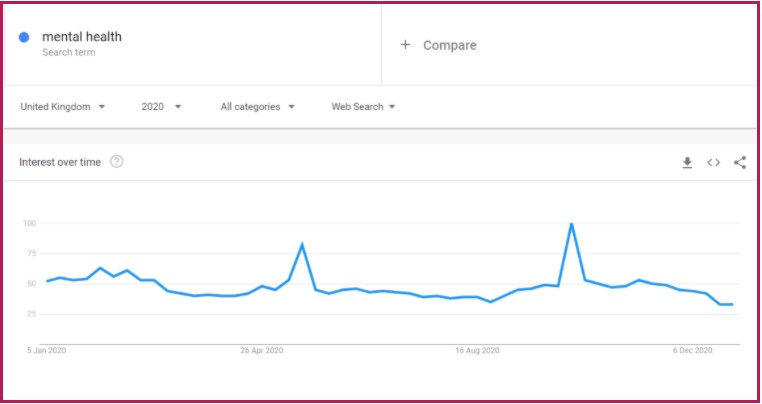
The rising and top searched terms were (not surprisingly) also related to mental health amidst the coronavirus.
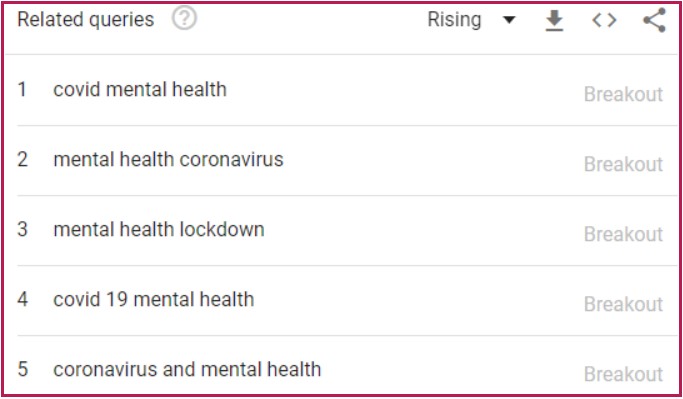
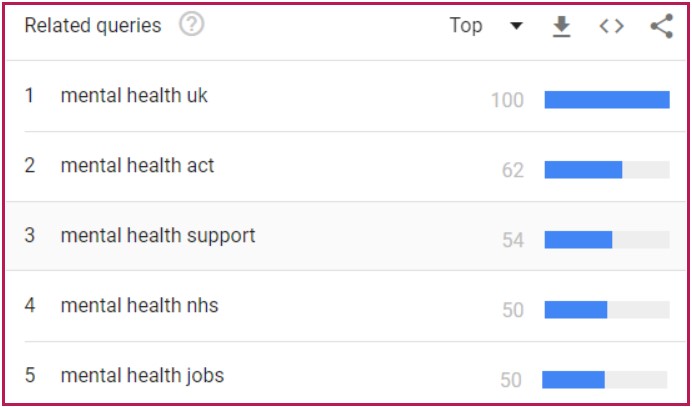
When compared to 2021 (so far!), we can see a different scenario when it comes to searches for ‘mental health’ – as shown below, it was searched far more frequently during the first three months of this year. We can see significantly more spikes, which might be related to the fact that it’s been a year since the UK’s first lockdown. People are now ‘used’ to the coronavirus and aware that it may not go away anytime soon, leading them to regularly seeking out mental health resources and support systems to cope with the situation.
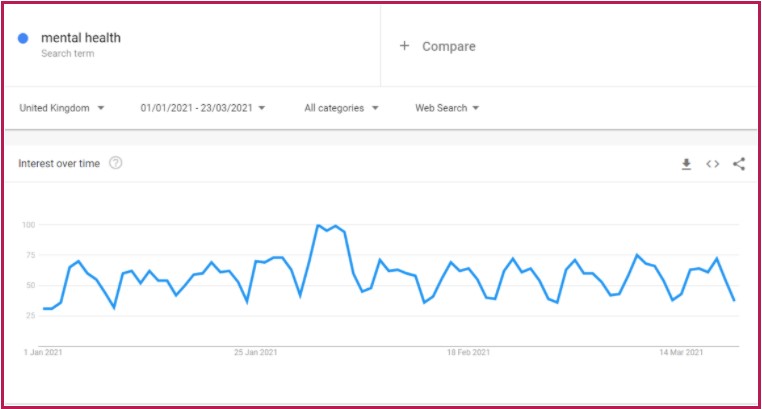
Related and rising queries, however, were more focused on children and long-term support, showing a shift in how many people are thinking about mental health – it appears many people are viewing mental health support as an important investment for themselves and future generations instead of just an acute, ‘temporary’ issue directly related to the coronavirus.
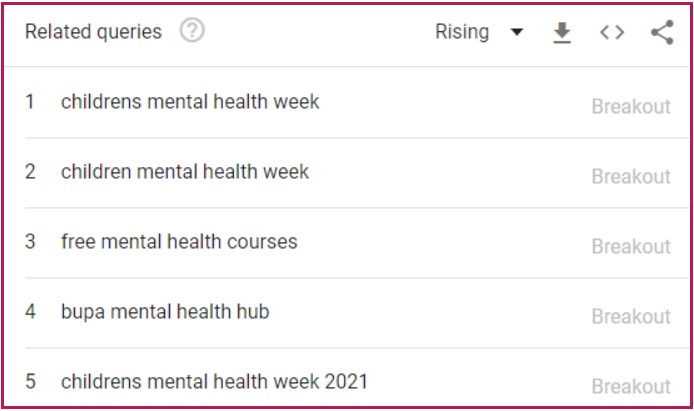
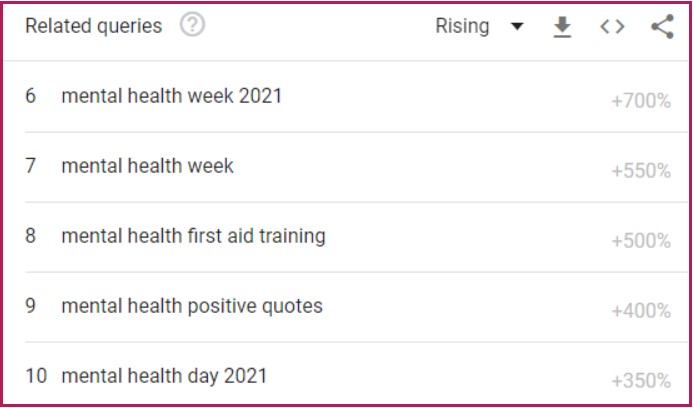
Now that we’ve had an overview of the main topics and search terms around mental health – and since this month is National Stress Awareness Month – we want to share the three main trends to keep an eye out for this year.
- Mental Health in the Workplace


Working remotely has become the norm for both employers and employees all over the UK. Therefore, it might come as no surprise that people want to keep working from home (or at least have more flexibility) even after the pandemic is over. According to a Leadership IQ survey called The State of Working From Home, 91% of participants would prefer to have the flexibility to work from home sometimes and 39% would like to work from home three to four days per week. Only 9% said they would want to work in an office full time.
At Passion, we ran a similar exercise last year on our LinkedIn, and we found out that the majority of people who engaged with the post (pictured below) prefered a mix of working from home and at the office.
Both of these studies show that employees benefit from the opportunity to work from home.
- Mental Health Resources
Now more than ever, there’s a high search demand for mental health resources online such as professional counselling, organisational approaches for business, wellbeing apps, mental health check ins from employers and free mental health resources.

It’s vital for employers to include initiatives and resources for their staff members, as being mentally well is crucial for both personal and professional development.
- Mental Health Conditions: ADHD
Search trends have indicated an interest about different mental health conditions – in particular, ADHD.
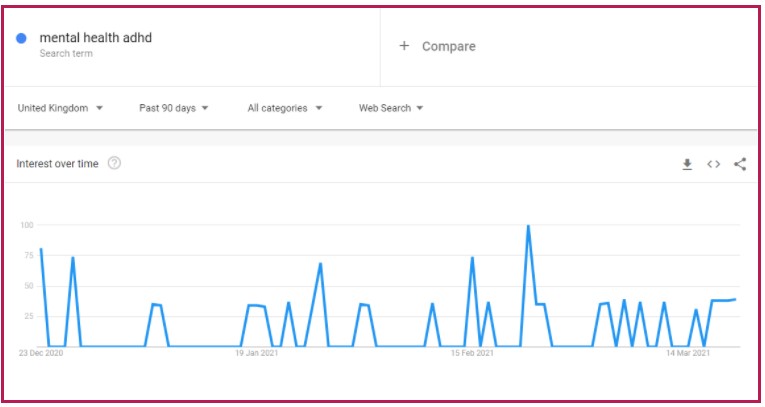
ADHD (attention deficit hyperactivity disorder) is one of the most searched terms in relation to mental health. This is not surprising, as this condition is known to be comorbid with other mental health conditions such as anxiety and depression.
We dug a bit deeper and found that, over the last three months, there has been an steady increase in searches around the term ADHD:
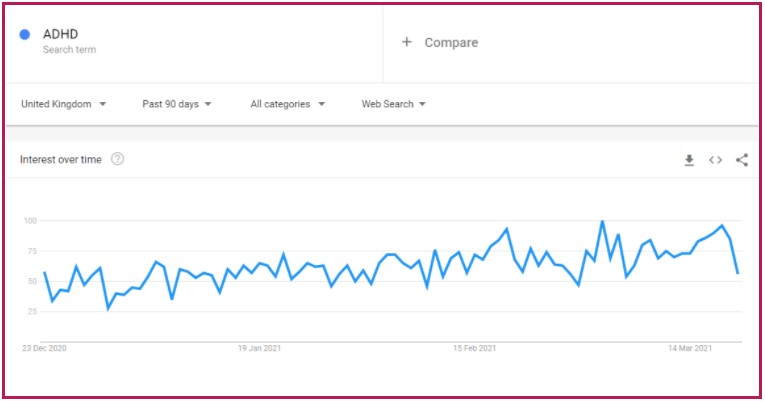
Also, a few related queries suggest that parents are looking for resources to help them identify if their kids have ADHD and how to handle it.
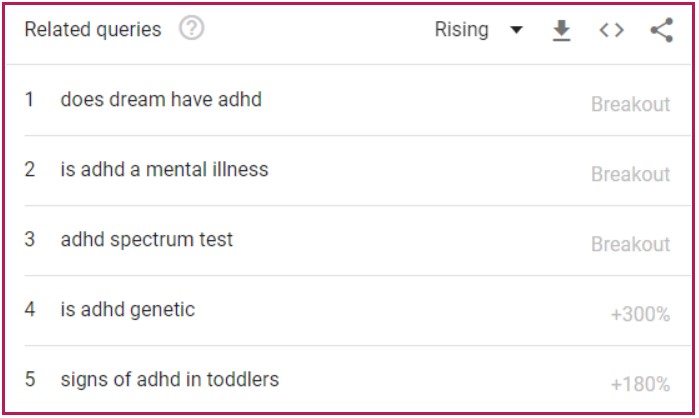
As we can see from the images above, there are a lot of spikes in searches about ADHD in relation to children’s mental health. This might be due to the fact that parents are homeschooling their kids, noticing ADHD symptoms they may not have been privy to otherwise and reaching out to Google for more information.
We hope this blog post gave you an insight into the most relevant SEO search terms related to mental health. Here at Passion, we’re always ready to support our clients. If you’d like some expert advice on how your SEO can thrive during the pandemic, please get in touch with our team of experts.
 Carolina Abaunza Moreno
Carolina Abaunza Moreno 